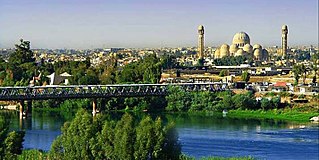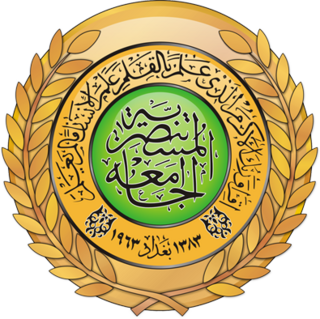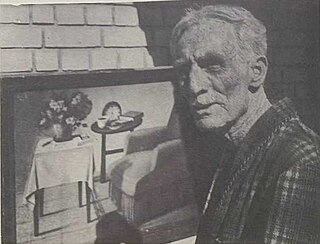Related Research Articles

Mosul is a major city in northern Iraq, serving as the capital of Nineveh Governorate. The city is considered the second-largest city in Iraq in terms of population and area after the capital Baghdad. Mosul is approximately 400 km (250 mi) north of Baghdad on the Tigris river. The Mosul metropolitan area has grown from the old city on the western side to encompass substantial areas on both the "Left Bank" and the "Right Bank", as locals call the two riverbanks. Mosul encloses the ruins of the ancient Assyrian city of Nineveh – once the largest city in the world – on its east side.
Indeterminism is the idea that events are not caused, or are not caused deterministically.
Muhammad Muhsin Khan was an Islamic scholar and translator of Afghan origin, who lived in Madinah and served as the Chief of Department of Chest Diseases at the King Faisal Specialist Hospital and Research Center. He translated both the Quran and Sahih Al-Bukhari into English. He was the director of the clinic of Islamic University of Madinah.

Ahmed Kousay Al-Taie was a United States Army soldier who was kidnapped in October 2006 in Baghdad and later killed by his captors; as of November 2021, he was the latest missing U.S. serviceman from the Iraq War to be recovered.

The Christians of Iraq are considered to be one of the oldest continuous Christian communities in the world.
Muhammad Taqi-ud-Din bin Abdil-Qadir Al-Hilali was a 20th-century Moroccan Salafi, most notable for his English translations of Sahih Bukhari and, along with Muhammad Muhsin Khan, the Qur'an, entitled The Noble Qur'an.
Muhammad Shamsher Ali is a former president of the Bangladesh Academy of Sciences, former vice-chancellor of Southeast University and former founder vice-chancellor of Bangladesh Open University.

Al-Mustansiriyah University is a public university located in Baghdad, Iraq. It traces its origin back to 1227. The modern form of the university was founded in 1963.

The College of Science is one of the Colleges of the University of Baghdad in Baghdad, Iraq. It was the first scientific college established in Iraq. The main academic activities held in this college vary between pure and applied science. Beside its eight departments, the college also holds two research units. Being one of the earliest academic institutes formed in the Republic of Iraq, the College of Science establishment marked the . This college was established on March 27, 1949, with the name of. The college was established with five scientific departments, namely:. The Pathology and Anatomy departments were later joined together to form the. Beside these, another four departments were added during the next fifty years, these are: Department of Geology (1953), Department of Computer Science (1983), Department of Astronomy (1998) and Department of Biotechnology (1999). The eight departments cover a wide range of branches of pure and applied sciences, which attracts many students as well as scientific researchers each year. Therefore, this college is considered as the largest scientific academic institute in the Republic of Iraq.
Professor Hamid M. K. Al- Naimiy is Chancellor at the University of Sharjah in the United Arab Emirates as well as Professor of Astronomy and Astrophysics.
This is a timeline of events during the War in Iraq in 2015.
Yunus ibn Matta is a prophet of God in Islam corresponding to Jonah son of Amittai in the Hebrew Bible. Jonah is the only one of the Twelve Minor Prophets in the Hebrew Bible to be named in the Quran. The tenth chapter of the Quran, Yunus, is named after him.

The Timeline of the War in Iraq covers the War in Iraq, a war which erupted that lasted in Iraq from 2013 to 2017, during the first year of armed conflict.

On 3 July 2016, ISIL militants carried out coordinated bomb attacks in Baghdad that killed 340 civilians and injured hundreds more. A few minutes after midnight local time, a suicide truck-bomb targeted the mainly Shia district of Karrada, busy with late night shoppers for Ramadan. A second roadside bomb was detonated in the suburb of Sha'ab, killing at least five.
This article lists the mass executions in Islamic State-occupied Mosul. Mosul, which is located in the Nineveh Governorate of Iraq, was occupied by the Islamic State (IS) from the Fall of Mosul on June 10, 2014, until the liberation of Mosul on July 10, 2017. Mosul is the second largest city in Iraq, and because of this, it was one of the Islamic State's largest bases, and their capture of the city was used in propaganda to demonstrate their military strength. Sunni Islam is the majority religion in the area. Mass executions of civilians, enemy soldiers, and members of IS who were accused of offenses were a regular occurrence, and executions peaked during the Mosul offensive. Mosul was the site of many of IS's war crimes. This article is a timeline of recorded mass executions carried out by IS in and around Mosul.

Omar Mohammed is an Iraqi historian, citizen journalist, and musician. He is best-known for creating Mosul Eye, an online news blog through which he documented life in the city of Mosul when it was occupied by the Islamic State between 2014 and 2017. He lives in exile, having left Iraq in 2017, and currently maintains the blog from France. In 2020, Omar Mohammed was recognized by Algemeiner as one of "The Top 100 People Positively Influencing Jewish Life." This acknowledgment reflects his significant contributions to documenting and understanding historical events and his broader impact on global human rights and interfaith relations. He currently leads the Antisemitism Research Initiative at George Washington University.
Ibrahim Mohammed Mahmoud al-Kufahi is a Jordanian poet, critic and professor. He was born in Irbid, Jordan on March 1, 1967, and it is where he studied. He obtained a degree in Arabic language and literature from Yarmouk University and a master's degree in literature and criticism from the same university. He worked as an Arabic teacher publishing his literary works in Jordanian newspapers and magazines such as Al Ra'i, Yarmouk and Voice of the Generation. He has a collection of poetry entitled The Qur’an and Venice (1991) and several other works.

Asim Hafidh (Arabic: عاصم حافظ, was an Iraqi artist, educator and writer. He was amongst the first Iraqi artists to study painting in the European style and was part of a group known as the Ottoman artists who were credited with bringing easel painting to Iraq. He is noted for publishing the first Iraqi book on fine art, entitled Rules for Drawing from Nature.
Bruno Abd al Haqq Guiderdoni is a French astrophysicist. He is a research director at the CNRS, and a member of the Centre de recherche astrophysique de Lyon (CRAL). He was director of the Observatoire de Lyon from 2005 to 2015. His research is primarily concerned with the origin and development of galaxies. He has also written extensively on Islamic theology and mysticism.
References
- ↑ "Dr Basil Altaie". The Muslim 500. Archived from the original on 2023-12-10. Retrieved 2021-12-27.
- ↑ "Dr. Mohammed. B. Altaie". Faculty Websites. 2021-12-27. Archived from the original on 2021-12-27. Retrieved 2021-12-27.
- ↑ الخلاوي 2018, p. 294.
- 1 2 Daneshgar & Saleh 2016, p. 348.
- ↑ "Seminar on the cosmologist Dr. Mohammed Basel al-Taie". University of Baghdad. 2021-08-28. Archived from the original on 2024-07-09. Retrieved 2024-07-09.
- ↑ "KRM: Staff: Scholars". KRM. Archived from the original on 2021-12-27. Retrieved 2021-12-27.
- ↑ Yazicioglu 2021, p. 276-277.